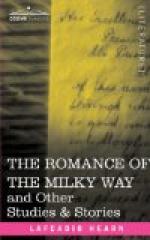[Footnote 14: Or, “my seldom-visited spouse.” The word tsuma (zuma), in ancient Japanese, signified either wife or husband; and this poem might be rendered so as to express either the wife’s or the husband’s thoughts.]
Am[’e] tsuchi to
Wakar[’e]shi toki yo
Onoga tsuma;
Shika zo t[’e] ni aru
Aki matsu ar[’e] wa.
[From the time when heaven
and earth were parted, she has
been my own wife;—yet,
to be with her, I must always wait
till autumn.[15]]
[Footnote 15: By the ancient calendar, the seventh day of the seventh month would fall in the autumn season.]
Waga k[=o]ru
Niho no omo wa
Koyo[:i] mo ka
Ama-no-kawara ni
Ishi-makura makan.
[With my beloved, of the
ruddy-tinted cheeks,[16] this
night indeed will I descend
into the bed of the River of
Heaven, to sleep on a pillow
of stone.]
[Footnote 16: The literal meaning is “b[’e]ni-tinted face,”—that is to say, a face of which the cheeks and lips have been tinted with b[’e]ni, a kind of rouge.]
Amanogawa.
Mikomori-gusa no
Aki-kaz[’e] ni
Nabikafu mir[’e]ba,
Toki kitarurashi.
[When I see the water-grasses
of the River of Heaven bend
in the autumn wind (I think
to myself): “The time (for our
meeting) seems to have come."]
Waga s[’e]ko ni
Ura-koi or[’e]ba,
Amanogawa
Yo-fun[’e] kogi-toyomu
Kaji no ’to kikoyu.
[When I feel in my heart a sudden longing for my husband,[17] then on the River of Heaven the sound of the rowing of the night-boat is heard, and the plash of the oar resounds.]
[Footnote 17: In ancient Japanese the word s[’e]ko signified either husband or elder brother. The beginning of the poem might also be rendered thus:—“When I feel a secret longing for my husband,” etc.]
T[=o]-zuma to
Tamakura kawashi
N[’e]taru yo wa,
Tori-gan[’e] na naki
Ak[’e]ba aku to mo!
[In the night when I am
reposing with my (now) far-away
spouse, having exchanged jewel-pillows[18]
with her, let not
the cock crow, even though
the day should dawn.]
[Footnote 18: “To exchange jewel-pillows” signifies to use each other’s arms for pillows. This poetical phrase is often used in the earliest Japanese literature. The word for jewel, tama, often appears in compounds as an equivalent of “precious,” “dear,” etc.]
Yorozu-yo ni
Tazusawari it[’e]
Ai mi-domo,
Omoi-sugu-b[’e]ki
Koi naranaku ni.
[Though for a myriad ages
we should remain hand-in-hand and
face to face, our exceeding
love could never come to an end.
(Why then should Heaven deem
it necessary to part us?)]




